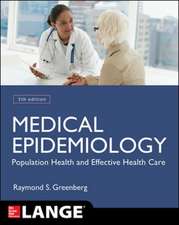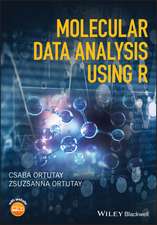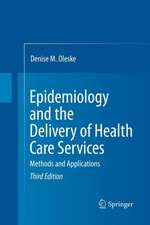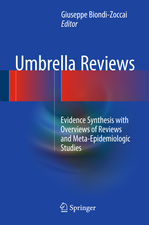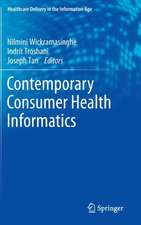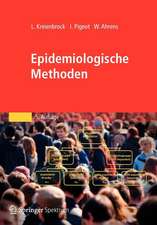Handbook of Epidemiology
Editat de Wolfgang Ahrens, Iris Pigeoten Limba Engleză Hardback – 15 apr 2025
The book provides a comprehensive overview of the field and covers basic approaches as well as novel and advanced methodologies with a strong applied focus by integrating the most relevant state-of-the-art knowledge that otherwise could only be gathered from single specialist publications dispersed over various scientific journals. It reviews the key issues and methodological approaches pertinent to the field for which the reader pursues an expatiated overview. It may thus serve both as a firstorientation for the interested reader and as a starting point for an in-depth study of a specific area as well as a quick reference and a recapitulatory update for the expert.
The broad scope of the book becomes apparent by its five sections that facilitate an integration of epidemiological concepts and methods, statistical tools, applications, and epidemiological practice: Part I covers Concepts and Designs in Epidemiology; Part II, Methodological Approaches in Epidemiology; Part III, Statistical Methods in Epidemiology; Part IV, Exposure-Oriented Epidemiology; and Part V, Outcome-Oriented Epidemiology.
All chapters follow a similar structure and highlight cross-references to related topics and specialist knowledge to be found in the Handbook. They give an overview of the topic and the most important problems and approaches that are illustrated by examples. Each chapter serves as an introductory text that helps to enter a new field by addressing basic concepts without being too elementary. Thus, it also is of interest for readers who are familiar with the particular topic by reflecting on its state-of-the-art and future perspectives. Each chapter stands on its own and comprises introductory elements that can be understood by the novice, i.e., a readership not being too familiar with the methodological background, and extends to in-depth knowledge that may serve as a reference for the trained epidemiologist. The standard procedures and methods, basic concepts, and knowledge are presented as well as recent advances and new perspectives. The list of references thus covers the whole range from introductory texts to publications for the advanced reader. In particular, the chapters on statistical methods are written for researchers in health sciences who do not have the background of theoretical statisticians and may be in need of application-oriented tools. These chapters offer numerous examples, practical applications, and illustrations.
Handbook of Epidemiology, 3rd Edition, is a relevant resource for professionals involved in health research, health reporting, health promotion, disease prevention, health services, and health systems administration, as well as those who need a reference book that covers all aspects of epidemiology as a comprehensive consultant for specific topics. The Handbook also is a useful text for researchers and graduate students in all disciplines related to epidemiology and public health.
Preț: 6442.18 lei
Preț vechi: 6781.25 lei
-5% Nou
Puncte Express: 9663
Preț estimativ în valută:
1233.79€ • 1271.17$ • 1033.54£
1233.79€ • 1271.17$ • 1033.54£
Carte nepublicată încă
Doresc să fiu notificat când acest titlu va fi disponibil:
Se trimite...
Preluare comenzi: 021 569.72.76
Specificații
ISBN-13: 9781071629932
ISBN-10: 107162993X
Ilustrații: XXV, 2800 p. 385 illus., 315 illus. in color. In 3 volumes, not available separately.
Dimensiuni: 155 x 235 mm
Ediția:3rd ed. 2025
Editura: Springer Us
Colecția Springer
Locul publicării:New York, NY, United States
ISBN-10: 107162993X
Ilustrații: XXV, 2800 p. 385 illus., 315 illus. in color. In 3 volumes, not available separately.
Dimensiuni: 155 x 235 mm
Ediția:3rd ed. 2025
Editura: Springer Us
Colecția Springer
Locul publicării:New York, NY, United States
Cuprins
An Introduction to Epidemiology.- Part I Concepts and Designs in Epidemiology.- History of Epidemiological Methods and Concepts.- Basic Concepts.- Rates, Risks, Measures of Association and Impact.- Descriptive Studies.- Cohort Studies.- Case-Control Studies.- Modern Epidemiological Study Designs.- Intervention Trials.- Cluster Randomized Trials.- Community-Based Health Promotion.- Systems-Oriented Approach to NCD Prevention.- Internet-Based Epidemiology.- Digital Epidemiology.- Interpretation of Study Results.- Part II Methodological Approaches in Epidemiology.- Design and Planning of Epidemiological Studies.- Quality Control and Good Epidemiological Practice.- Epidemiological Field Work in Population-Based Studies.- Exposure Assessment.- Misclassification.- Confounding and Interaction.- Sensitivity Analysis and Bias Analysis.- Use of Health Registers.- Emergency and Disaster Health Surveillance.- Screening.- Epidemiology in Developing Countries.- Health Services Research.- Ethical Aspects of Epidemiological Research.
Notă biografică
Wolfgang Ahrens, PhD, is deputy scientific director of the Leibniz Institute for Prevention Research and Epidemiology -- BIPS in Bremen, Germany. Prof. Dr. Ahrens also is professor of epidemiological methods at the University of Bremen, Germany, and head of the Department of Epidemiological Methods and Etiological Research at BIPS.
Iris Pigeot, PhD, is director of the Leibniz Institute for Prevention Research and Epidemiology -- BIPS in Bremen, Germany. Prof. Dr. Pigeot also is full professor (C4) in the Department of Mathematics and Computer Science at the University of Bremen, Germany, and head of the Department of Biometry and Data Management at BIPS.
Iris Pigeot, PhD, is director of the Leibniz Institute for Prevention Research and Epidemiology -- BIPS in Bremen, Germany. Prof. Dr. Pigeot also is full professor (C4) in the Department of Mathematics and Computer Science at the University of Bremen, Germany, and head of the Department of Biometry and Data Management at BIPS.
Caracteristici
Serves as the primary reference for theoretical and applied researchers in epidemiology Gives a broad overview of theoretical concepts and applied methodologies in epidemiology Covers all areas of epidemiology from statistics to outcome-oriented epidemiology
Recenzii
“This is the best single source comprehensive textbook on epidemiology of human diseases, ranging from: statistical analysis to field work on the disorders. … I recommend this both as an atlas and textbook good for years to come.” (Joseph J. Grenier, Amazon.com, May, 2015)

